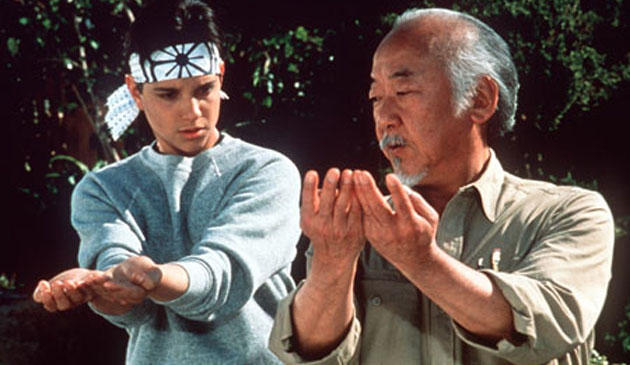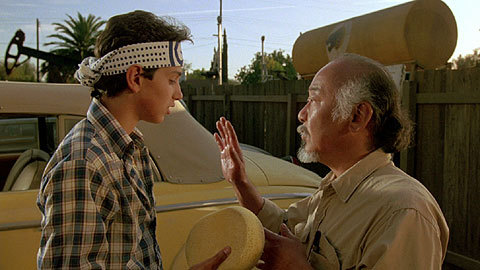Out of the great 1980’s movie era came what is widely regarded as one of the most iconic films in movie history, The Karate Kid. In this film, the protagonist Daniel-San is perpetually bullied and beat up by the Karate students of the Cobra Kai dojo until the wise sage and Karate master Mr. Miyagi steps in and saves him. Eventually, Mr. Miyagi reluctantly agrees to teach Daniel-San Karate in order to beat the Cobra Kai bullies in a local Karate tournament.
Unbeknownst to Daniel-San, Mr. Miyagi begins teaching him Karate through regular household chores; waxing Miyagi’s car, painting his house and fence, and sanding his wooden deck. Of course without the end result in mind, to Daniel-San this is nothing more than being an errand boy in a feeble attempt to earn Mr. Miyagi’s time so he’ll teach him real Karate. This only lasts for four days, until finally Daniel-San has had enough with the chores and furiously decides its time to go home.
“Daniel-San!” exclaims Mr. Miyagi. “Come here!”
As a martial artist myself, I love what follows in this scene between these two characters. Mr. Miyagi begins to unfold what his plan has been all along. “Sand the floor” is not simply a technique Daniel-San learns to make a deck look nice, but to block kicks coming at his midsection. “Paint the fence” is not only the proper technique for exterior remodeling, but for blocking high and low punches as well. “Wax on, wax off” is another way of saying, “Use correct technique or you’re going to get punched in the face.”
Daniel-San finally gets it; he’d been learning Karate all along.
Sometimes I feel like my attempts at learning theology are much like Daniel-San’s approach to learning karate. I don’t want to know application and wisdom, I just want to know facts and answers. My pride gets in the way and turns theology into an intellectual pursuit rather than worship. It is all too easy for me to turn my studies of the Scriptures into an attempt to tear down other peoples philosophies and worldviews, completely neglecting the fact that I’m supposed to be drawing closer to the holy and loving God of the entire universe. In haste, I determine that people who aren’t teaching me enough facts aren’t teaching me enough “theology.” After all, in order to be the best around you have to know more than everyone else, right?
Take for example when I started my Islam class a couple years ago. I went into the class wanting a five-point systematic discourse on how to tear apart Muslim apologists. Instead, I learned that if I don’t actually love people, I have no business engaging in evangelistic dialogue – regardless of how much I know.
Wax on, wax off. Paint the fence, Ben-San.
When I first became a Christian and the majesties of God were opened to me, I bought every apologetic resource I could find hoping to prove to my friends why I was right and they were wrong. I had no conception that a right understanding of God should only lead me to a correct worship of God.
Wax on, wax off. Paint the fence, Ben-San.
I think about how often I go into a sermon on Sunday simply looking for new nuggets of information and knowledge, rather than a desire to draw near to the throne of grace through the preaching of God’s Word. Instead of setting myself at the foot of the cross, seeking to have the Word of God pierce my heart, I elevate myself to a place where I feel worthy of picking apart good or bad facts.
Wax on, wax off. Paint the fence, Ben-San.
After every one of these examples, I had a moment where I realized that my original desires weren’t for real theology, but something entirely different. Every time my knowledge and pride puffs me up, like a crane kick to the face I get knocked down and realize I don’t know real theology at all.
The truth is, more often then not I act like one of the antagonist students from Cobra Kai than I do a protege of Mr. Miyagi. My goal is to show no mercy, sweeping the leg of my opponents and humiliating them at whatever cost. Oh Lord, shape my study of you to lead towards praise of you! It has been said that a right theology leads to proper doxology. May my life be evidenced not by how much I know, but by the magnitude of the God I worship. He must increase, but I must decrease.
Being the best around isn’t about how much you know, but instead is defined by being united to a compassionate and loving God through the sacrifice of Christ, as evidenced by your kindness and goodness towards other people. Being the best around means realizing that Christ is Lord over all, and that I am the least of these worthy to be called one of his own.
If you’re anything like me, then you love ordering things on Amazon Prime. Books, gifts (I do all of my birthday and Christmas shopping on Amazon) and basically everything else except for my groceries are purchased with Amazon. It’s such a time and money saver!
I’ve recently been thinking a lot about the term salvation (or, deliverance), and I started to realize that in many ways the “components” of salvation can be broken down the same way as an Amazon Prime order. When we order things online we naturally just think of that purchase as a one step process. I click, it shows up two days later. Similarly, today we often minimize salvation to a one-step deal, and end up equating salvation to simply being the same thing as being forgiven (justified) without realizing that in our salvation we get ALL of Christ, not just one small piece of him.
But if you think about it, an Amazon Prime order isn’t as simple as just clicking on an item and then having it show up at your door a few days later. There are a few steps along the way, which I will outline below:
1) The Transaction: At some point, you add an item to your cart and click ‘buy’. When this happens, a transaction takes place. You paid for the item in order to get it from Amazon. The item could never be yours without a transaction where you pay for it in full.
2) A Change in Ownership: Immediately following the transaction, the item becomes mine and it is guaranteed to me. Because of Amazon’s guarantee to the customer, there is no scenario where I will end up without the item. It is now mine.
3) The Delivery Process: Unfortunately, Amazon has yet to invent space-time warp particle displacers, so the item cannot be instantly transferred to me. It must first be placed on a truck and sent out by Amazon and come via a delivery service. Even if the delivery process hits a snag or a delay, the process will still ultimately end up with me getting the product I ordered, because of the price I paid, the change in ownership and the guarantee to me.
4) The Arrival: Two days after your order, the product you paid for in the transaction that became yours ends up in your hands!
See, an Amazon Prime delivery isn’t as simple as one step – even though sometimes it may seem that way. In a similar way, we should see our deliverance – our salvation – as something much bigger than just one step.
Indeed a transaction took place to purchase us; we are a blood-bought people. But we are not only blood-bought people, because when the divine transaction of Christ dying in our place occurred to forgive us of our sin, we became children of our Heavenly Father. Our ownership was transferred out of this world and we became adopted as sons and daughters, acquiring the inheritance of Christ.
But, having been ransomed to the Father, we are not instantly taken to him. No, there is now a “delivery process” where we are being made more like his Son. I recently ordered some comics from Amazon (don’t judge me!), but rather than delivering them to me the UPS driver just took them to the local UPS center for pickup instead. The delivery hit a snag – yes it was a delay, but it didn’t erase the reality that those comics still belong to me, and are guaranteed to me. This is our sanctification; we are being prepared for the day when we will be presented to the Groom as the beautiful, spotless Bride. There may be hiccups on the way, snags that seem to slow or even reverse the process, but we are promised to Him. Nothing can now separate us from our guaranteed delivery.
Finally, in our glorification we will arrive in the Fathers presence. Never to leave his presence, we look forward to the final state of being delivered into his hands.
This comparison, of course, is not at all to belittle the magnitude and beauty of our salvation. However, I think this is a helpful picture for realizing that there is more than one piece to our salvation – and that is a good thing. So, to summarize in the paraphrased words of Herman Bavinck; in salvation, Christ first restores our relationship to God, then we are adopted into God, then he renews us after God’s image, and finally preserves for us our heavenly inheritance.
Guaranteed.

Lee Forrest via Compfight cc
He bore my sin on Calvary’s tree
And Righteousness bestowed on me
That I might see his face.
God justified me, set me free,
And glorified I soon will be:
How marvelous this grace.
-James Montgomery Boice
—–
After two years as a committed Calvinist, I’m done. No longer will I wear the quotes of dead white dudes on my sleeves; no longer will I stand committed to cleverly articulated doctrines in the shape of a flower.
Well, at least, not formally.
It has long been my conviction that titles and labels in Christianity are helpful so long as they serve to point people to Christ and stir their affections for Him. Labels and distinctions are helpful to communicate what and why we believe to be true about Christ, the Church and his Word.
The problem is, the term “Calvinism” often draws more hatred than it does stir affections; it turns people away from Christ rather than drawing them to Him. I’ve noticed this happens for one of three reasons: either 1) people don’t understand “Calvinism” and so they draw caricatures or interact with a false depiction of it, writing it off as cruel or mean, 2) people mistakenly think “Calvinists” worship Calvin over Christ, or 3) they’ve only interacted with cocky, prideful people who mistakenly believe themselves to be “true Calvinists.”
Taking these three things into consideration, I’m giving up on “Calvinism” and the five points of TULIP. Where these terms have failed, it is now my purpose and intention to elevate the grandeur and grace of my King Jesus Christ. You see, my King is gracious and worthy to be worshiped beyond all comparison. There is no one more worthy of his praise. Even if he were not gracious and kind to us he would still be worthy of all my worship because that is just who he is.
Yet, he is gracious. He’s so loving and gracious to us that we can’t begin to fathom it. Without Christ, all of us are dead in a rebellious state against the creator (Romans 3:9-18, Ephesians 2:1). When the Bible says dead, it means dead. Corpse. Lifeless. Incompatible with life. But in his kindness to us, knowing the consequences of our sin is death (Romans 6:23), he predestined a plan for us in the fullness of time (Ephesians 1:10-11).
This plan is Christ our Savior. On the cross, Jesus died for his sheep (John 10:11). The definiteness of his death is what enables the Apostle to say that before the foundations of the world he knew us! This efficacious grace in our lives does not mean we are robots just waiting for God to make a move. To paraphrase one of my favorite Christian artists, it was while we were dead and a slave to sin that we were actually robots. True freedom of our will only come when Christ breaks into our reality and frees us from life in the machine.
When Christ graciously, lovingly, and rightfully makes himself King of our lives he holds us tight in his hands. We are not held tight in his hands only, but because Christ and the Father are one we are held tight in the Father’s hands as well(John 10:28-30). What assurance this is! So much grace is given to us that the grace of God does not only save us but keeps us. Those whom Christ proclaims as his are kept until the very end. This is not some trite saying of “once saved always saved.” No, those whom the father saves he restores, and those whom he restores he fuels to obedience and good works. Those who are redeemed will be known by their works, those who are not known by their works are not redeemed (James 2:18).
This life, this inheritance, this adoption as a son or daughter is grace. Sweet, loving, amazing grace. Who are we to argue about this love? Who are we to deny the grace and love of our Father in heaven and diminish it to some argument over labels and titles? I do not love “Calvinism” because I worship Calvin; I am grateful to the work of Calvin and saints of history past for their work that helps point me to Christ, increasing my love for Him. If we decline the hard work and labor from the history of the Church, we are cutting ourselves off from the richness revealed to our forebears by the Holy Spirit.
Abraham Kuyper once said, “The special trait of Calvinism [is its ability to place] the believer before the face of God, not only in His church, but also in his personal, family, social, and political life. The majesty of God, and the authority of God press upon the Calvinist in the whole of human existence.” The sad reality is that many people who claim “Calvinism” do not live the way Kuyper outlines, favoring instead cockiness, arrogance and pride. Brothers and sisters, this should not be so! How can a doctrine that is all about the necessary grace and love of a God far greater than we can imagine ever make us prideful!?
The only hallmark of true Calvinism should be that of a penitent spirit, someone who wakes up in the morning and cries out, “God, have mercy on me, a sinner” (Luke 18:13). This kind of posture of the heart can never take the form of pride or arrogance. B.B Warfield explains the “Calvinist” as “humble souls, who, in the quiet of retired lives, have caught a vision of God in His glory and are cherishing in their hearts that vital flame of complete dependence on Him.”
But as I said, I’m done with “Calvinism.” Seeing as how the name and fragrance of its tulips deter people from the grace of the King, from now on I will primarily and solely speak of His grace sans labels. See, I don’t want to convince anyone of “Calvinism.” Oh Lord would it not be so! No, I want to convince you of grace. If and when my “Calvinism” begins to get in the way of that more often than not, then I’m done with the title. My motivation is now to live my life in such a way that when you ask me why I live the way I do, I can confidently say “Grace.” Or, what was formerly known as “Calvinism.” No labels, no titles, no doctrines wrapped up in a pretty bow. Just grace.
Words have purpose. When words are used either frequently and/or in the wrong settings, they tend to lose that purpose and all meaning associated with them. An observable example of this is when we call customer service centers for support; they’ve told people to “Please hold, we will be right with you” so many times, that “be right with you” can mean anywhere from 10 to 60 minutes. Or think about how often we use words like “literally,” “starving,” or “explode.” “I’m literally going to explode from starvation if…”
No, you’re not.
In a similar fashion, today’s evangelical ghetto has lost its understanding of the word “salvation.” We often speak of “salvation” as equatable to our justification, that is, being “saved” and now in a right standing before God because of the work and sacrifice of Christ. The problem is, these two words are not equatable. Salvation does not simply mean justification or “saved.” It means so much more. We will only truly understand salvation when we understand all of who Christ is and all that belongs to him.
Our justification is only one part of our salvation. Some have spoken of this as not only understanding what we are saved from but what we are saved to. When we are justified before God we become united to his Son by faith. When this happens, we become not only partakers in his righteousness and justification, but in his inheritance as a son, in his likeness as we become progressively more like Christ, and eventually in his resurrection body when we receive our own in glorification.
These aspects are often spoken of as the benefits of Christ. Counter-intuitively and counter-culturally one of these benefits is becoming a partaker and sharing in Christ’s sufferings. The Apostle Paul explains this well in his epistle to the Philippians:
Indeed, I count everything as loss because of the surpassing worth of knowing Christ Jesus my Lord. For his sake I have suffered the loss of all things and count them as rubbish, in order that I may gain Christ and be found in him, not having a righteousness of my own that comes from the law … and may share his sufferings, becoming like him in his death, that by any means possible I may attain the resurrection from the dead. – Phil. 4:8-11
When we become united to Christ in faith, we become partakers in his sufferings. One aspect of this portion is gaining the above mentioned benefits which Christ earned as a result of his sufferings and death.
The other aspect is that we ourselves will suffer (Phil. 1:19), and it is an honor to do so.
In his time here on earth, Jesus himself promised that we will have trouble in this life (John 16:33). Because they first hated him, they will hate us also (John 15:18). One guaranteed sign that you are part of Christ’s elect is that you have or are suffering in this life. It is promised to us.
What this means is that just as our Savior and Lord was beaten and bruised to a bleeding pulp, so too can we expect this life to bruise us and beat us until we think we can take no more. And, when we feel like giving up, we remember that he has overcome the world and there is a prize far greater than we can imagine being kept for us in heaven (1 Pet. 1:4). We may want to tap out, but we remember that when Christ suffered and died, death itself sucked in innocent blood. When it did so, it ingested poison; death died. So we run the race, we persevere until the very end, seeking after the one who has gifted us with sharing in his sufferings.
Then, on that day this bruised and beaten body will finally be taken home and we will see him face to face. We will see his scars and wounds (Rev 5:6) and we will say, out of supreme worship and adoration, “Your scars are beautiful.”
Then – and only then – will our sufferings finally and truly make sense.



